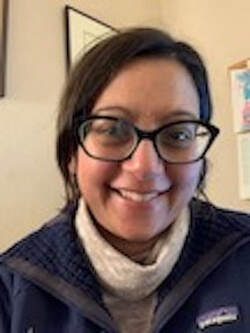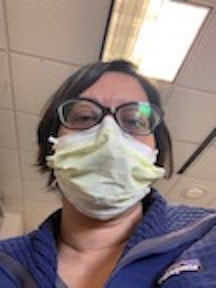
March 2020
Dr. Arati Karnik, a member of the Urban Adventure Squad Board of Directors, is a family physician in Philadelphia. We asked her to offer her perspective on the current situation, how it is affecting her patients and the medical residents she teaches, and how to stay safe and prepared.
Flattening the Curve
I am a Family Physician. I have spent 10 years working as faculty in a residency training program. One month ago, COVID-19 seemed like so many of “those” diseases, affecting people far away, like Ebola and SARS, with some cases trickling into the United States but always well contained.
My hospital diagnosed its first case over the weekend of March 14-15. It will be the first of many, many more.
What are hospitals doing right?
Hospitals are keeping non-essential workers home, trying to ramp up or start telehealth systems, and donning protective gear when evaluating sick patients.
What do hospitals need to do more of?
Testing, testing, testing. This is limited by availability and lack of coordination at the federal level.
Hospitals must also be vigilant about not mixing healthy populations with the sick. This is where we all play a part. It is imperative that we understand the magnitude of our impact. Social distancing is NOT just a catchy phrase in the days of social media; it is real, and what we do can have a true and life-saving impact.
So please, think twice before you have friends over, go to a restaurant to eat (if they have not already closed where you live), play a pickup basketball game, or take your kids to the playground.
If you do any of this, you are part of the spread and you probably do not know it. You won’t truly get it until a loved one gets sick, you are quarantined, or you see an elderly parent or family member quickly deteriorate and be unable to breathe.
If there is anything that Family Physicians are passionate about, it is prevention. In this case, the primary form of prevention--a vaccine--is not available to protect us. The only protection we have is to keep this from spreading the best we can and not to let our selfish needs get in the way. Flattening the curve—that is, reducing the number of people who contract Coronavirus, so that we can make sure our healthcare system is not overwhelmed—and how we can do that is only thing that should be going viral right now.
What we need most, for our health and safety as well as yours, is for everyone to stay home unless you need hospital-level care. The only thing that will decrease the spread of Coronavirus is for us to stay home and separate ourselves from others.
How do we prepare medical residents during a pandemic?
Medicine meets education in residency training programs. As faculty in a community-based Family Medicine residency program, I am seeing first-hand the impact of COVID-19 across the board for my residents. Some take on the medical challenge, soaking up the daily changes and knowledge; some are clearly anxious and fearful of contracting the disease in their day-to-day duties admitting patients when on call, or seeing patients in the clinic or at other hospitals where they are rotating.
Some rotations have told medical residents to stop coming in, while others put them at higher risk either in the emergency room or intensive care unit.
In my clinic, we are trying to balance meeting our patients’ needs while protecting our healthcare providers and staff. That means limiting well visits and trying to create protocols to screen and properly triage ill patients.
The consequences of a pandemic and the drastic changes that programs and health systems have to make are unprecedented in the United States. While some may argue that this education is valuable to the trainees of the health care force, it may also cause our medical residents to rethink their life of service in the health care fields.
Healthcare workers will be putting themselves at risk of infecting themselves and their families, of seeing a level of illness they may not ever have imagined, and of burning out from the strain placed on the workers and the system as a whole.
As a faculty member and mentor, I work to be supportive--a conveyor of information, a compassionate listener, and proactive. Now more than ever, we need everyone in health care to step up and do their part to help patients through this pandemic. And we need our trainees to know that we care about them, about their training, and about their personal health.
We are experiencing a major public health care crisis, and we all have a role to play. Doing nothing is not an option. There is even a new, state-by-state tool, covidactnow.org, to help us understand the consequences of inaction.
We have the ability to reduce the spread of Coronavirus. To do that, we need to listen the advice of public health officials, keep our hands washed, and stay home, so that we can all help flatten the curve.
Dr. Arati Karnik, a member of the Urban Adventure Squad Board of Directors, is a family physician in Philadelphia. We asked her to offer her perspective on the current situation, how it is affecting her patients and the medical residents she teaches, and how to stay safe and prepared.
Flattening the Curve
I am a Family Physician. I have spent 10 years working as faculty in a residency training program. One month ago, COVID-19 seemed like so many of “those” diseases, affecting people far away, like Ebola and SARS, with some cases trickling into the United States but always well contained.
My hospital diagnosed its first case over the weekend of March 14-15. It will be the first of many, many more.
What are hospitals doing right?
Hospitals are keeping non-essential workers home, trying to ramp up or start telehealth systems, and donning protective gear when evaluating sick patients.
What do hospitals need to do more of?
Testing, testing, testing. This is limited by availability and lack of coordination at the federal level.
Hospitals must also be vigilant about not mixing healthy populations with the sick. This is where we all play a part. It is imperative that we understand the magnitude of our impact. Social distancing is NOT just a catchy phrase in the days of social media; it is real, and what we do can have a true and life-saving impact.
So please, think twice before you have friends over, go to a restaurant to eat (if they have not already closed where you live), play a pickup basketball game, or take your kids to the playground.
If you do any of this, you are part of the spread and you probably do not know it. You won’t truly get it until a loved one gets sick, you are quarantined, or you see an elderly parent or family member quickly deteriorate and be unable to breathe.
If there is anything that Family Physicians are passionate about, it is prevention. In this case, the primary form of prevention--a vaccine--is not available to protect us. The only protection we have is to keep this from spreading the best we can and not to let our selfish needs get in the way. Flattening the curve—that is, reducing the number of people who contract Coronavirus, so that we can make sure our healthcare system is not overwhelmed—and how we can do that is only thing that should be going viral right now.
What we need most, for our health and safety as well as yours, is for everyone to stay home unless you need hospital-level care. The only thing that will decrease the spread of Coronavirus is for us to stay home and separate ourselves from others.
How do we prepare medical residents during a pandemic?
Medicine meets education in residency training programs. As faculty in a community-based Family Medicine residency program, I am seeing first-hand the impact of COVID-19 across the board for my residents. Some take on the medical challenge, soaking up the daily changes and knowledge; some are clearly anxious and fearful of contracting the disease in their day-to-day duties admitting patients when on call, or seeing patients in the clinic or at other hospitals where they are rotating.
Some rotations have told medical residents to stop coming in, while others put them at higher risk either in the emergency room or intensive care unit.
In my clinic, we are trying to balance meeting our patients’ needs while protecting our healthcare providers and staff. That means limiting well visits and trying to create protocols to screen and properly triage ill patients.
The consequences of a pandemic and the drastic changes that programs and health systems have to make are unprecedented in the United States. While some may argue that this education is valuable to the trainees of the health care force, it may also cause our medical residents to rethink their life of service in the health care fields.
Healthcare workers will be putting themselves at risk of infecting themselves and their families, of seeing a level of illness they may not ever have imagined, and of burning out from the strain placed on the workers and the system as a whole.
As a faculty member and mentor, I work to be supportive--a conveyor of information, a compassionate listener, and proactive. Now more than ever, we need everyone in health care to step up and do their part to help patients through this pandemic. And we need our trainees to know that we care about them, about their training, and about their personal health.
We are experiencing a major public health care crisis, and we all have a role to play. Doing nothing is not an option. There is even a new, state-by-state tool, covidactnow.org, to help us understand the consequences of inaction.
We have the ability to reduce the spread of Coronavirus. To do that, we need to listen the advice of public health officials, keep our hands washed, and stay home, so that we can all help flatten the curve.
